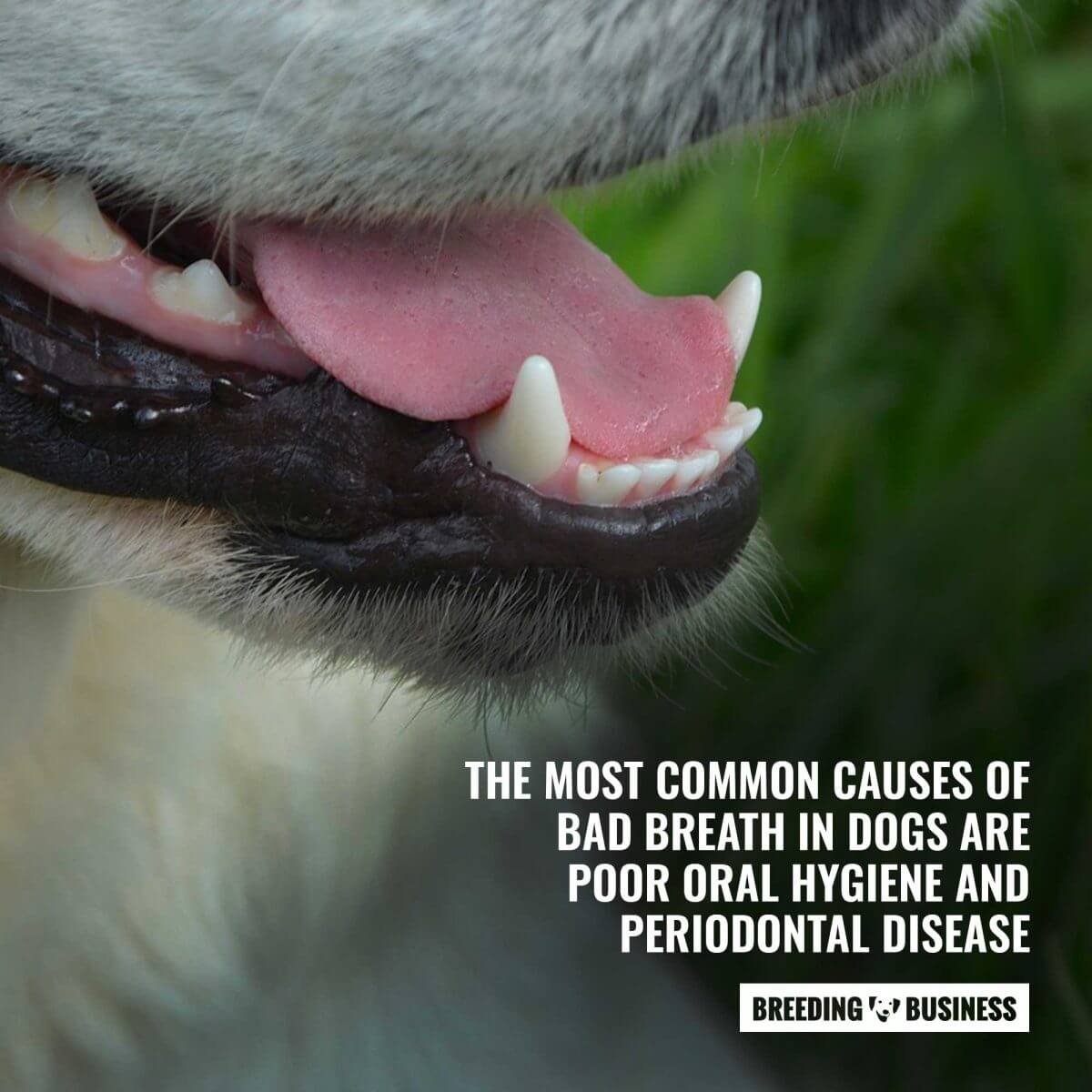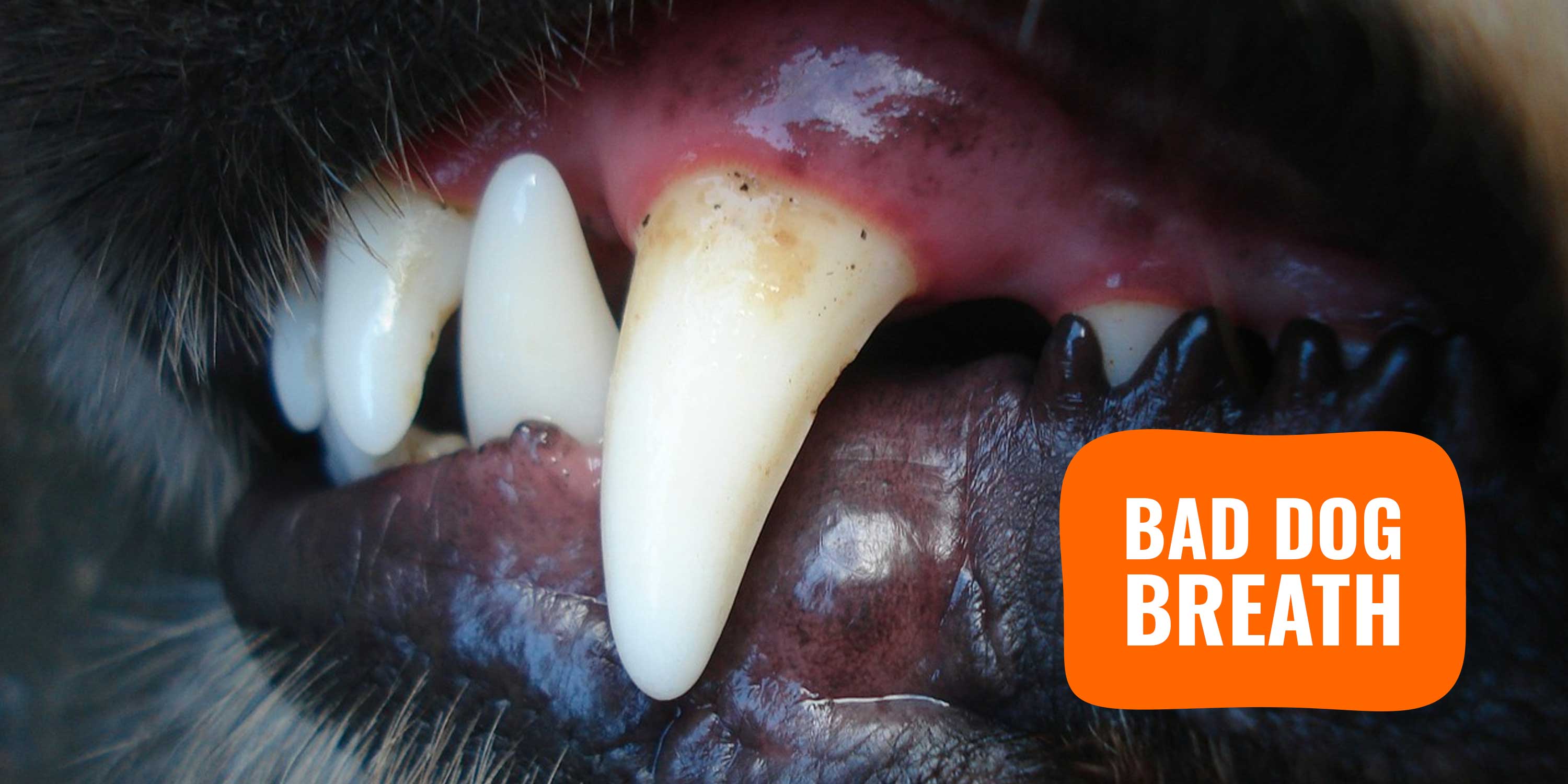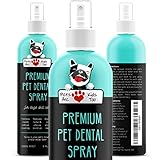Bad dog breath is very common and dog owners simply get used to it. But it should not be that way. Most times, canine halitosis is a sign of poor periodontal health.
The term “doggy breath” is normally used in a condescending way to refer to people who have stinky breath. You’d think that this is because a dog always has bad breath, but this really couldn’t be farther from the truth.
What does a dog’s stinky breath smell like?
Typically, a dog’s breath can have unpleasant odors resembling fish, feces, urine, acetone, ammonia, sewage, garbage, decaying animals, rotting cheese, blood, or similar smells.
However, it’s important to note that consistently foul-smelling breath in dogs is not normal. Such bad odors from your dog’s mouth can indicate the presence of diseases or disorders. If your dog’s breath smells like any of the mentioned odors, it suggests a problem that needs attention as soon as possible.
A dog’s breath, just like human breath, should not have a distinct smell
Is bad dog breath a symptom or a medical condition?
Stinky dog breath can be a symptom or a medical condition, depending on the smell.
Halitosis is a medical condition where dogs suffer from chronic bad breath due to disease and poor oral hygiene. When a dog’s teeth are not properly brushed, plaque and tartar can build up, leading to a foul smell.
In some cases, specific odors from a dog’s breath may indicate a problem with their internal organs. It could be a symptom of something more serious, like tumors or kidney disease.
A study even showed that there seems to be a correlation between bad breath in the human owner and their dog.
Causes for Bad dog Breath
As discussed above, bad dog breath can be a symptom as well as a medical condition. As a condition, bad breath in dogs is caused by a number of factors. The main factor being a lack of oral hygiene for extended periods of time.
Periodontal Disease
Poor oral dental hygiene is the number one cause for stinky dog breath or halitosis in dogs.
Not brushing your dog’s teeth for a long time and not changing toothbrushes regularly could be the root of the problem. They cause a plaque or tartar buildup on the teeth. Over time, this plaque gets so thick it starts to push the teeth away from the gums.
Consequently, this creates more space for bacteria to thrive inside the gums and mouth, resulting in bad breath as well as teeth and gum infections. Cavities, root infections, and a condition called gingivitis are all caused by poor dental hygiene.

Kidney Disease
If your dog’s breath smells strongly of ammonia or urine, it could be a symptom of kidney disease.
The logic behind this is that if the kidneys aren’t functioning properly, urea in the dog’s body isn’t being eliminated. The residual urea remains in the dog’s system for longer than it should and causes an ammonia smell and urine-like breath.
Kidney disease, which causes halitosis, is in fact also caused by periodontal disease. When neglected, dental disorders in dogs can become advanced and cause an overflow of germs and bacteria into the mouth. These get ingested and enter the bloodstream, causing long-term damages to kidneys and liver.
Toxic Plants
If your dog’s breath smells like rotting cheese or toxic fumes, it could mean that they have consumed a poisonous plant.
It’s normal for dogs to be seen chewing and eating plants when they have an upset stomach—it helps them vomit.
However, domestic dogs lack the sense to differentiate poisonous plants from the safe ones and sometimes end up eating the former. This causes an acidic, rancid smell from their mouth. In some cases, the dogs will eliminate the poisonous plant from their system, but sometimes, medical intervention will be needed.
Diabetes
When your dog’s breath smells like chemicals or gives off a whiff of acetone, it’s likely that they are suffering from diabetes. Diabetes can also cause your dog’s breath to smell sickly sweet like your breath smells after drinking very sweet tea.
A diabetic dog lacks insulin. And without insulin, it becomes very difficult for the dogs to break down the sugars that they consume. In order to derive the necessary sugars, the dog’s body starts breaking down fat. This results in the dog’s body going into ketosis, and ketones are a byproduct of this. These ketones smell like acetone causing their breath to smell like chemicals.
This is a very serious disorder and may even cause blindness, dehydration, and weaknesses in the dog. It must be treated with urgency and due care.
Pica and Coprophagia
Pica and coprophagia are eating disorders in dogs when the animals believe inedible items to be food and try and eat them. This is what causes their breath to smell of whatever it is that they have eaten – from paper to poop!
Pica refers to the act of eating objects like shoes, paper, wood, etc. Most dogs tend to eat toys, rocks, wood, and even chew off some fabric. This could be dangerous as they may choke on the small parts.
Coprophagia is more distasteful and refers to a dog’s habit of eating feces, either their own or of other animals. This causes their breath to smell like poop, for obvious reasons. While coprophagia may harm the dogs by causing an infection transmitted via the bacteria and viruses in the fecal matter, it won’t necessarily kill the animal.
Both these disorders are caused by the behavioral traits of the dogs and sometimes by wrong training practices also.
Oral Tumors
Oral tumors or advanced dental diseases that cause an influx of bacteria into the mouth can make the dog’s breath smell like garbage or sewers. It gives off an extremely foul odor. In extreme cases of negligence, these oral tumors may bleed and give off an unpleasant metallic odor due to blood iron content.
Dogs usually develop oral tumors, lesions, and masses, as a result of poor oral hygiene. Over a period of time, negligence of periodontal health causes the gums to deteriorate and finally rot. This causes the teeth to fall out, gums to bleed, and teeth sockets to develop tumors. The rotting flesh and bacteria in the mouth cause the stinky breath in the dogs.
Diet
Vet-approved dog food can also cause bad breath in dogs. Meat, bones, and other food items tend to get stuck in their teeth, causing their mouth to stink. Sometimes, it could just be that the food that is not being digested properly and is giving off a bad smell.
It’s a good idea to speak to your dog dentist about what food to feed the dog. Very dry meals food that is too wet could also be causing the issue. Undigested food could be sending stomach acids and gases up into the mouth and causing a stench. Favor raw feeding or freeze-dried and even human-grade dog foods when possible.
Prevention of bad breath in dogs
Most dog food companies have fooled us into believing that a dog’s breath is normally stinky. Now nobody loves the feeling of stinky dog breath on their faces. Eliminating the root cause of the bad breath is always a better idea that temporarily making the dog’s breath smell tolerable.
Here’s how you can prevent bad breath in dogs.
Brushing Teeth
Just like we need to brush our teeth, dogs need regular teeth cleanup as well. This helps get rid of the plaque and tartar buildup that causes a stinky mouth. Brushing regularly (thrice a week at least) can get rid of any food stuck in their teeth and help prevent the gums from rotting away.
Gum Hygiene
Get your dog’s gums checked for diseases, infections, tartar buildup, and cavities every six months. Gum hygiene is extremely important in dogs, especially with larger breeds who are much more susceptible to lesions and tumors.
Poor gum hygiene causes masses to develop within the spaces between the gums and teeth and can cause bigger problems in the long term. Periodically, check your dog’s gums yourself. If you see any inflammation or if they are very red, see a vet immediately.
Homemade Diet
Your dog’s diet is the most important factor in managing bad breath. Eating packaged dog meals that are full of preservatives may also lead to bad breath and chemical breath in dogs.
Try and prepare fresh, balanced, homemade meals for your pets. This will not just prevent bad breath but will also help prevent other diseases related to the kidneys, liver, and heart. This, in turn, will ensure that a dog’s mouth doesn’t give off any ungodly odor.
Feeding your dog raw carrots and pieces of apples can also help the problem of bad breath. When cooking meals for your dog, crush some fresh parsley or mint over the food. This not only leaves their breath smelling fresh but will also help in the digestion process. Feeding your dog yogurt is a good idea as it introduces healthy bacteria into the gut and drives away the bad bacteria.
For dogs that have persistent bad breath, lots of fresh water mixed with a spoon of apple cider vinegar can also have game-changing benefits.
Chew Toys
High-quality chew toys are now available in the market that can help control the buildup of plaque and tartar and clean the dog’s mouth out. Not only do these toys leave your dog’s mouth odor-free and fresh but they also strengthen the gums and teeth.
Sometimes, the root cause of behavioral disorders like coprophagia (eating feces) and pica is boredom. Giving toys that keep your dog busy will help prevent such problems too.
Treatment for Halitosis in Dogs
The treatment of halitosis depends on the severity of the problem and the cause of the condition. One size doesn’t fit all in this case.
Obviously, it is always better to try and eliminate the root cause of the problem instead of finding temporary solutions like dental chew sticks and fresh smelling herbs.
Here’s what to do if your dog’s bad breath problem persists or gets worse.
Dental Cleaning
Most bad breath problems in dogs are due to poor oral hygiene. So the first thing you must do is visit a dog-dentist to get your pet’s teeth cleaned thoroughly.
Get the vet to perform an exhaustive dental and mouth checkup—they’ll look for lesions, tumors, cavities or rotting food inside the mouth.
To get rid of all the plaque that has been building up over a period of time, you may need multiple dental sessions. Speak to your vet about dental hygiene maintenance for your dog. The market is full of innovative products that help you maintain your dog’s dental health with little-to-no effort. Get regular dental follow-ups done until your dog breath smells like nothing.
Vet Treatment
If the stench persists in spite of thorough plaque removal, the root cause could be something else. You’ll have to speak to your vet and get the necessary tests done in order to confirm what the problem is first.
If your dog has a kidney or liver problem or is found with oral lesions and tumors—you must take utmost care and follow the doctor’s instructions carefully.
In such a scenario, your dog’s breath is a telltale sign of how their health is improving.
Dietary Changes
If your dog suffers from coprophagia or pica, it could be that eating feces is a sign of poor nutrition in your dog. Your dog could be relying on feces for the nutrition that they aren’t getting from the food you give them. Find out the root cause and get to it.
If the bad breath is due to certain foods that your dog finds difficult to digest, start making the necessary changes to their diet.
In order to cure bad dog breath, you’ll need to have a lot of patience. Finding the right diet for your dog will require some trial and error.
Incorporate fresh fruits, veggies, and other healthy foods like probiotic yogurt into your dog’s diet. This will not only cleanse the internal system but will also help them keep their teeth clean.
What are the best home remedies for bad breath in dogs?
Here’s a list of items you can find in your kitchen cabinet or herb garden that can help deal with your dog’s bad breath.

Neem
Neem extract is widely used in Ayurveda to treat bacterial infections and make the skin, hair, and overall health supple and strong. It works the same way for dogs too, making their coat shinier, immunity stronger, and teeth better.
Simply crush a few dehydrated neem leaves and put it in your dog’s food (both sweet and bitter neem will do here). You could also buy neem extract and add a few drops of it to your dog’s kibble.
Coconut oil
Coconut oil not only gives a sweet smell to the mouth, but its antibacterial qualities also rid the dog’s system of any infections or viruses.
Even better for your dog, this oil tastes good for them and they’ll slurp it up without you having to encourage them.
Cinnamon
This deliciously fragrant herb can make anything smell great with its spicy sweetness. A sprinkle over the food or straight into the mouth can help get rid of the bad breath in dogs.
Cinnamon is also good for dogs and helps keep diabetes and yeast infections at bay too – win-win for all!
Fresh Water
Let your dog lap up all the fresh clean water they can. This could very well be the end of their bad breath problems—plain fresh water. Just ensure that you change the water in the bowl often and clean the bowl well.
If the problem persists, half a teaspoon of apple cider vinegar can do wonders for your dog’s dental hygiene and digestive system both.
How long will it take to rid my dog of its foul breath?
Dental chews and fragrant spices and herbs can help for instant and temporary relief from halitosis in dogs. For long-term treatments, the time frame depends on the severity of the disorder and the treatment.
In dogs, chronic bad breath caused by periodontal problems and diseases can take a few months to clear up. Regular sessions of teeth cleaning with a vet will ensure that the problem is resolved in around six months.
For more serious conditions like tumors, kidney problems, or gastrointestinal issues, the time frame is extremely subjective and it could take up to two years to get rid of the chronic bad breath and solve the root problem.


